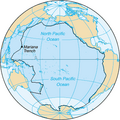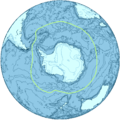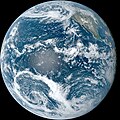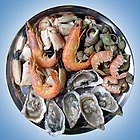Portal:Oceans
– Hover over image and scroll to middle for controls to see more selected panorama images –
Introduction
| Earth's ocean |
|---|
|
Main five oceans division: Further subdivision: Marginal seas |

The ocean is the body of salt water that covers approx. 70.8% of Earth. In English, the term ocean also refers to any of the large bodies of water into which the world ocean is conventionally divided. The following names describe five different areas of the ocean: Pacific, Atlantic, Indian, Antarctic/Southern, and Arctic. The ocean contains 97% of Earth's water and is the primary component of Earth's hydrosphere, thus the ocean is essential to life on Earth. The ocean influences climate and weather patterns, the carbon cycle, and the water cycle by acting as a huge heat reservoir. (Full article...)

A sea is a large body of salty water. There are particular seas and the sea. The sea commonly refers to the ocean, the wider body of seawater. Particular seas are either marginal seas, second-order sections of the oceanic sea (e.g. the Mediterranean Sea), or certain large, nearly landlocked bodies of water. (Full article...)
Oceanography (from Ancient Greek ὠκεανός (ōkeanós) 'ocean', and γραφή (graphḗ) 'writing'), also known as oceanology, sea science, ocean science, and marine science, is the scientific study of the oceans. It is an Earth science, which covers a wide range of topics, including ecosystem dynamics; ocean currents, waves, and geophysical fluid dynamics; plate tectonics and seabed geology; and fluxes of various chemical substances and physical properties within the ocean and across its boundaries. These diverse topics reflect multiple disciplines that oceanographers utilize to glean further knowledge of the world ocean, including astronomy, biology, chemistry, geography, geology, hydrology, meteorology and physics. Paleoceanography studies the history of the oceans in the geologic past. An oceanographer is a person who studies many matters concerned with oceans, including marine geology, physics, chemistry, and biology. (Full article...)
Selected article -
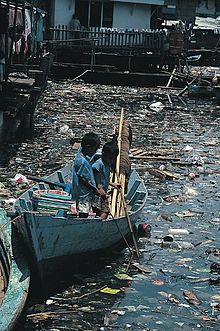
Marine pollution occurs when substances used or spread by humans, such as industrial, agricultural and residential waste, particles, noise, excess carbon dioxide or invasive organisms enter the ocean and cause harmful effects there. The majority of this waste (80%) comes from land-based activity, although marine transportation significantly contributes as well. It is a combination of chemicals and trash, most of which comes from land sources and is washed or blown into the ocean. This pollution results in damage to the environment, to the health of all organisms, and to economic structures worldwide. Since most inputs come from land, either via the rivers, sewage or the atmosphere, it means that continental shelves are more vulnerable to pollution. Air pollution is also a contributing factor by carrying off iron, carbonic acid, nitrogen, silicon, sulfur, pesticides or dust particles into the ocean. The pollution often comes from nonpoint sources such as agricultural runoff, wind-blown debris, and dust. These nonpoint sources are largely due to runoff that enters the ocean through rivers, but wind-blown debris and dust can also play a role, as these pollutants can settle into waterways and oceans. Pathways of pollution include direct discharge, land runoff, ship pollution, bilge pollution, atmospheric pollution and, potentially, deep sea mining.
The types of marine pollution can be grouped as pollution from marine debris, plastic pollution, including microplastics, ocean acidification, nutrient pollution, toxins and underwater noise. Plastic pollution in the ocean is a type of marine pollution by plastics, ranging in size from large original material such as bottles and bags, down to microplastics formed from the fragmentation of plastic material. Marine debris is mainly discarded human rubbish which floats on, or is suspended in the ocean. Plastic pollution is harmful to marine life. (Full article...)Interesting facts -
- Heather Willauer (pictured) patented a method for removing carbon dioxide (CO2) from seawater, in tandem with hydrogen (H2) removed simultaneously. Willauer has researched catalysts to enable a continuous Fischer–Tropsch process to recombine carbon monoxide (CO) and hydrogen gases into complex hydrocarbon liquids to synthesize jet fuel for Navy and Marine aviation, and fuel for the U.S. Navy's ships at sea.
- The sea cucumber Leptopentacta elongata has a U-shaped or S-shaped body and occupies a burrow in the seabed.
- The POLYGON experiment, conducted in the 1970s, was the first experiment to establish the existence of so-called "mesoscale eddies", giving rise to the "mesoscale revolution" in oceanography.
Selected list articles and Marine habitat topics
| Marine habitats |
|---|
| Coastal habitats |
| Ocean surface |
| Open ocean |
| Sea floor |
- List of oceans
- List of ancient oceans
- List of seas
- List of circumnavigations
- List of cruise lines
- List of largest lakes and seas in the Solar System
- List of marine biologists
- List of marine ecoregions
- List of maritime explorers
- List of naval battles
- List of ocean liners
- List of oceanographic institutions and programs
- List of oldest surviving ships
- List of rogue waves
- List of seafood dishes
- List of submarine topographical features
Tasks
 |
Here are some tasks awaiting attention:
|
General images -
Related portals
In the news
- 8 June 2024 –
- Doctors Without Borders recovers 11 bodies and rescues dozens of migrants off the coast of Libya. (Al Jazeera)
- 7 June 2024 – Yemeni civil war
- Red Sea crisis
- 6 June 2024 – Red Sea crisis
- The Houthis and the Islamic Resistance in Iraq claim to have launched two joint military attacks against ships at the Port of Haifa in Israel. However, Israel denies the claims. (Al Jazeera)
- 31 May 2024 – Red Sea crisis
- 30 May 2024 Yemen strikes
- The death toll from yesterday's U.S. Navy and British Navy airstrikes in Yemen increases to 16 with 35 others injured. (AP)
WikiProjects
Topics
Categories
Associated Wikimedia
The following Wikimedia Foundation sister projects provide more on this subject:
-
Commons
Free media repository -
Wikibooks
Free textbooks and manuals -
Wikidata
Free knowledge base -
Wikinews
Free-content news -
Wikiquote
Collection of quotations -
Wikisource
Free-content library -
Wikiversity
Free learning tools -
Wiktionary
Dictionary and thesaurus
Admiralty law
| Admiralty law |
|---|
| History |
| Features |
| Contract of carriage/Charterparty |
| Parties |
| Judiciaries |
| International conventions |
| International organizations |
Need assistance?

Do you have a question about oceans, seas or oceanography that you can't find the answer to? Consider asking it at the Wikipedia reference desk.
External media

- World Ocean Database and World Ocean Atlas Series – from the U.S. National Centers for Environmental Information, National Oceanic and Atmospheric Administration. Includes the World Ocean Atlas.
- European Atlas of the Seas – the European Atlas of the Seas, from the European Commission
- NOAA Research – NOAA research news, Oceanic and Atmospheric Research (OAR)
- Ocean Research – from The World Ocean Observatory
- Ocean Biodiversity Information System – "a global open-access data and information clearing-house on marine biodiversity for science, conservation and sustainable development"









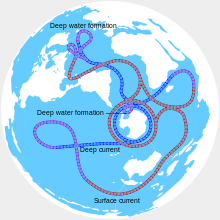























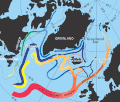



























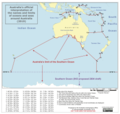
















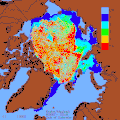
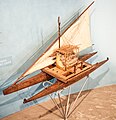










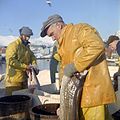




![Image 88"Terres Australes" [sic] label without any charted landmass (from Southern Ocean)](http://upload.wikimedia.org/wikipedia/commons/thumb/8/8e/Geography_world_map.jpeg/120px-Geography_world_map.jpeg)





